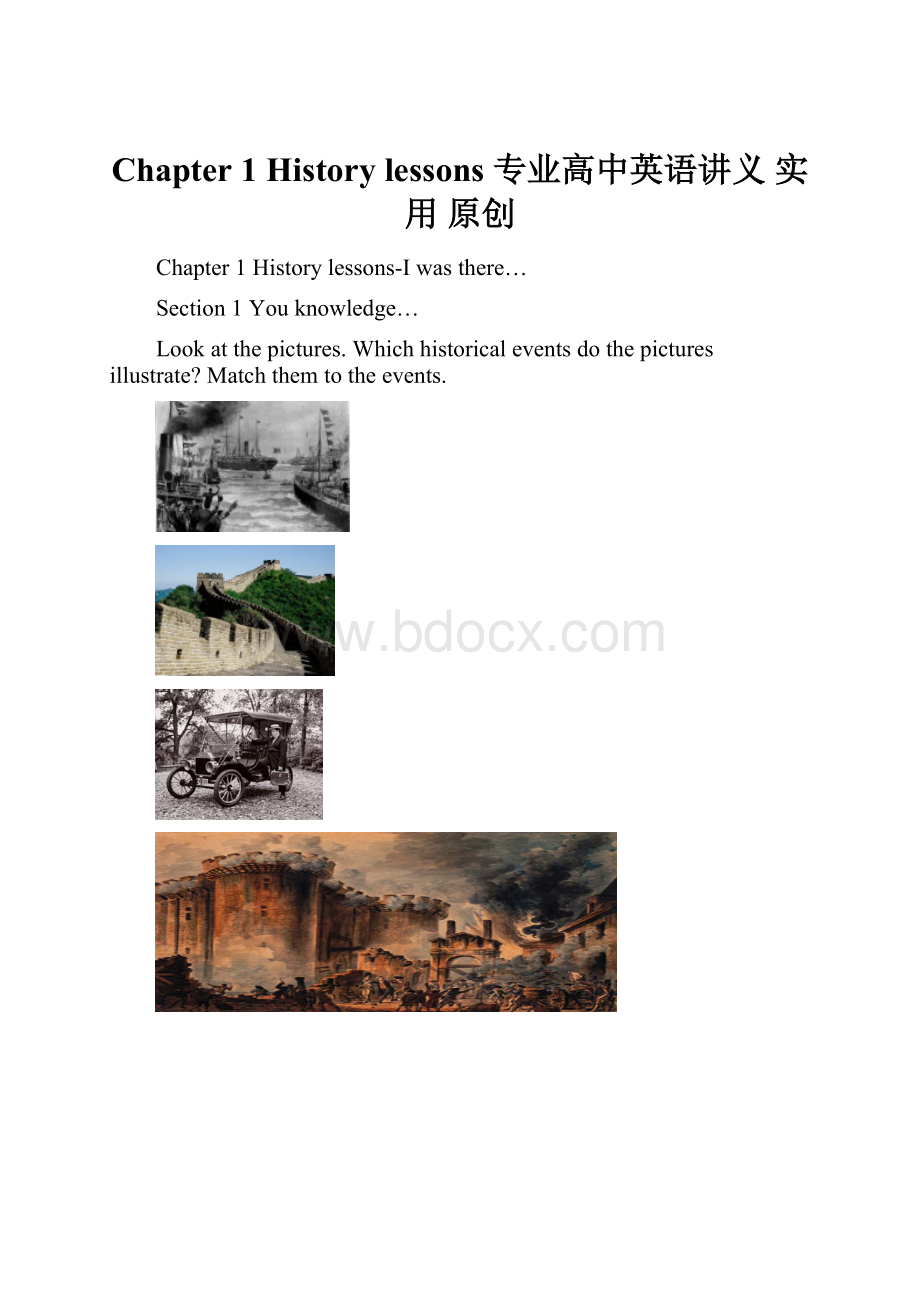Chapter 1 History lessons 专业高中英语讲义 实用 原创.docx
《Chapter 1 History lessons 专业高中英语讲义 实用 原创.docx》由会员分享,可在线阅读,更多相关《Chapter 1 History lessons 专业高中英语讲义 实用 原创.docx(36页珍藏版)》请在冰豆网上搜索。

Chapter1Historylessons专业高中英语讲义实用原创
Chapter1Historylessons-Iwasthere…
Section1Youknowledge…
Lookatthepictures.Whichhistoricaleventsdothepicturesillustrate?
Matchthemtotheevents.
A.FirstWorldWarbegins
B.GreatWallofChinabuilt
C.CharlesDarwinpublishesOntheOriginofSpecies
D.StormingoftheBastille-startoftheFrenchRevolution
E.TerroristattackdemolishesWorldTradeCenterinNewYork
F.GottliebDaimlerandKarlBenzproducethefirstautomobiles
G.LeonardodaVincipaintstheMonaLisa
H.FirstOlympicGamesheldinGreece
I.USdropsfirstatomicbombsonHiroshimaandNagasaki
J.AmericanWarofIndependencebegins
Section2
Iwasthere…
24August,AD79
TheeruptionofVesuvius
ByPlinytheYounger
ThiswastheeruptionthatdestroyedandburiedthetownsofPopeiiandHerculaneum
On24August,intheearlyafternoon,mymotherdrewattentiontoacloudofunusualsizeandappearance.Itwasnotclearatthatdistancefromwhichmountainthecloudwasrising.(ItwasafterwardsknowntobeVesuvius)Itsgeneralappearancecanbeexpressedasbeinglikeanumbrellapine,foritrosetoagreatheightonasortoftrunkandthensplitoffintobranches.Broadsheetsoffireleapingflamesblazedatseveralpoints.Bythistimethecourtyardwasfullofashessothatitslevelhadrisen.Thebuildingswerenowshakingwithviolentshocksandseemedtobeswayingtoandfro.
MymotherandIfinallydecidedtoleavethetown.Wewerefollowedbyapanic-strickenmobofpeople.Oncebeyondthebuildingswestopped,andtherewehadsomeextrodinaryexperienceswhichthoroughlyalarmedus.Wesawtheseasuckedawayandapparentlyforcedbackbytheearthquake:
itrecededfromtheshoresothatquantitiesofseacreatureswereleftstandedondrysand.Onthelandwardsideafearfulblackcloudpartedtorevealgreattonguesoffire,likeflashesoflightningmagnifiedinsize.Soonafterwardsthecloudsankdowntoearthandcoverdthesea:
ithadalreadyblottedoutCapri.Youcouldheartheshrieksofwomen,thewailingofinfants,theshoutsofmen.Manybesoughttheaidsofgodsleft,andthattheuniversewasplungedintodarknessforevermore.
Aslastthedarknessthinned.Thentherewasgenuinedaylight,andthesunactallyshoneout.Wewereterrifiedtoseeeverythingchanged,burieddeepinasheslikesnowdrifts.
12December,1901
ThefirstradiosignalacrosstheAtlantic
ByGuglielmoMarconi
ThesignalwassentfromPoldhuinCornwalltoGuglielmoMarconi,waitingonacliffinNewfoundland.
Shortlybeforemid-dayIplacedthesignalearphoneonmyearandstartedlistening.Thereceiveronthetablebeforemewasverycrude—afewcoilsandcondensers—novalves,noamplifiers,notevenacrystal.Theanswercameat12.30whenIheard,faintlybutdistinctly,pip-pip-pip.IhandedthephonetoKemp:
‘canyouhearanything?
’Iasked.‘Yes,’hesaid.theletterS’-hecouldhearit.Iknewthenthatallmyanticipationshadbeenjustified.TheelectricwavessentoutintospacefromPoldhuhadtraversedtheAtlantic-theenormousdistanceof1,700miles-unimpededbythecurvatureoftheearth.Theresultmeantmuchmoretomethanthemeresuccessfulrealizationsofanexperiment,itwasanepochinhistory.InowfeltforthefirsttimeabsolutelycertainthatthedaywouldcomewhenmankindwouldbeabletosendmessageswithoutwiresnotonlyacrosstheAtlanticbutalsobetweenthefurthermostendsoftheearth.
Questions
A.whoisdescribingit?
Isthepersonaprotagonistoranobserver?
B.Whowerethepeopleinvolved?
Howdidtheyreact?
C.Canyouexplainthefeelingofthepeoplewhentheysaid:
a.Oncebeyondthebuildingswestopped,andtherewehadsomeextraordinaryexperienceswhichthoroughlyalarmedus.
b.Manybesoughttheaidsofgodsleft,andthattheuniversewasplungedintodarknessforevermore.
c.ButIwasatlastonthepointofputtingthecorrectnessofallmybeliefstothetest.
d.Iknewthenthatallmyanticipationshadbeenjustified.
e.InowfeltforthefirsttimeabsolutelycertainthatthedaywouldcomewhenmankindwouldbeabletosendmessageswithoutwiresnotonlyacrosstheAtlanticbutalsobetweenthefurthermostendsoftheearth.
Wordsusedtoexpressaperson’sfeeling
anxioushopefuloffendedmiserableregretful
gloomymoodymadinsanepleasedirritatedupsetsorrowfuldisgustedgrievoussorrowfulpanickedmerryjoyousgratefulmiserableuneasydepresseddiscouragedfrustratedannoyedenthusiasticpuzzledconfused
D.Dividethewordsbelowintonouns,verbs,adjectivesoradverbs.
trunk
split
leap
blaze
sway
panic-stricken
mob
extraordinary
thorough
alarm
suck
apparent
recede
quantities
landward
fearful
reveal
part
magnify
sink
plunge
wailing
shriek
terrified
deep
traverse
unimpeded
curvature
wire
epoch
E.Canyoufindthesentencesinpassivevoices?
Howaretheydifferentintenses?
Section3GrammarFocusPassiveVoice
高中英语被动语态讲解
一、被动语态的构成形式
1.被动语态的基本时态变化
被动语态通常为十种时态的被动形式,被动语态由be+过去分词构成,be随时态的变化而变化。
以do为例,各种时态的被动语态形式为:
1)am/is/are+done(过去分词)一般现在时
例Visitorsarerequestednottotouchtheexhibits.
2)has/havebeendone现在完成时
例Allthepreparationsforthetaskhavebeencompleted,andwe'rereadytostart.
3)am/is/arebeingdone现在进行时
例Anewcinemaisbeingbuilthere.
4)was/weredone一般过去时
例IwasgiventenminutestodecidewhetherIshouldrejecttheoffer.
5)hadbeendone过去完成时
例Bytheendoflastyear,anothernewgymnasiumhadbeencompletedinBeijing.
6)was/werebeingdone过去进行时
例AmeetingwasbeingheldwhenIwasthere.
7)shall/willbedone/begoingtobedone/beabouttobedone/betobetodone一般将来时
例Hundredsofjobswillbelostifthefactorycloses.
8)should/wouldbedone/was\weregoingtobedone/was\wereabouttobedone/was\weretobetodone一般将来时
例Thenewswouldbesenttothesoldier'smotherassoonasitarrived.
9)shall/willhavebeendone将来完成时(少用)
例TheprojectwillhavebeencompletedbeforeJuly.
10)should/wouldhavebeendone过去将来完成时(少用)
例Hetoldmethathisnewclotheswouldhavebeenmadeverysoon.
2.被动语态的特殊结构形式
1)带情态动词的被动结构。
其形式为:
情态动词+be+过去分词。
例Thebabyshouldbetakengoodcareofbythebaby-sitter.
2)有些动词可以有两个宾语,在用于被动结构时,可以把主动结构中的一个宾语变为主语,另一宾语仍然保留在谓语后面。
通常变为主语的是间接宾语。
例Hismothergavehimapresentforhisbirthday.可改为Hewasgivenapresentbyhismotherforhisbirthday.
3)当“动词+宾语+宾语补足语”结构变为被动语态时,将宾语变为被动结构中的主语,其余不动。
例Someonecaughttheboysmokingacigarette.可改为Theboywascaughtsmokingacigarette.
4)在使役动词have,make,get以及感官动词see,watch,notice,hear,feel,observe等后面不定式作宾语补语时,在主动结构中不定式to要省略,但变为被动结构时,要加to。
例Someonesawastrangerwalkintothebuilding.可改为Astrangerwasseentowalkintothebuilding.
5)有些相当于及物动词的动词词组,如“动词+介词”,“动词+副词”等,也可以用于被动结构,但要把它们看作一个整体,不能分开。
其中的介词或副词也不能省略。
例ThemeetingistobeputofftillFriday.
3.非谓语动词的被动语态
v.+ing形式及不定式todo也有被动语态(一般时态和完成时态)。
例Idon'tlikebeinglaughedatinthepublic.
二、Itissaidthat+从句及其他类似句型
一些表示“据说”或“相信”的动词如believe,consider,expect,report,say,suppose,think等可以用于句型“It+be+过去分词+that从句”或“主语+be+过去分词+todosth.”。
有:
Itissaidthat…据说,Itisreportedthat…据报道,Itisbelievedthat…大家相信,Itishopedthat…大家希望,Itiswellknownthat…众所周知,Itisthoughtthat…大家认为,Itissuggestedthat…据建议。
例Itissaidthattheboyhaspassedthenationalexam.(=Theboyissaidtohavepassedthenationalexam.)
三、谓语动词的主动形式表示被动意义
1.英语中有很多动词如break,catch,clean,drive,lock,open,sell,read,write,wash等,当它们被用作不及物动词来描述主语特征时,常用其主动形式表达被动意义,主语通常是物。
例Thiskindofclothwasheswell.
注意:
主动语态表被动强调的是主语的特征,而被动语态则强调外界作用造成的影响。
试比较:
Thedoorwon'tlock.(指门本身有毛病)
Thedoorwon'tbelocked.(指不会有人来锁门,指“门没有锁”是人的原因)
2.表示“发生、进行”的不及物动词和短语,如:
happen,last,takeplace,breakout,comeout,comeabout,cometrue,runout,giveout,turnout等以主动形式表示被动意义。
例Howdothenewspaperscomeout?
这些报纸是如何引出来的呢?
3.系动词没有被动形式,但有些表示感受、感官的连系动词feel,sound,taste,book,feel等在主系表结构中常以主动形式表示被动意义。
例Yourreasonsoundsreasonable.
四、非谓语动词的主动形式表被动意义
在某些句型中可用动名词和不定式的主动形式表被动意义。
1.在need,want,require,bear等词的后面,动名词用主动形式表示被动意义,其含义相当于动词不定式的被动形式。
Thehouseneedsrepairing(toberepaired).这房子需要修理。
2.形容词worth后面跟动名词的主动形式表示被动含义,但不能跟动词不定式;而worthy后面跟动词不定式的被动形式。
例Thepicture-bookiswellworthreading.(=Thepicture-bookisveryworthytoberead.)
3.动词不定式在名词后面作定语,不定式和名词之间有动宾关系时,又和句中另一名词或代词构成主谓关系,不定式的主动形式表示被动含义。
例Ihavealotofthingstodothisafternoon.(todo与things是动宾关系,与I是主谓关系。
)
试比较:
I’llgotothepostoffice.Doyouhavealettertobeposted?
(此处用不定式的被动语态作定语表明you不是post动作的执行者。
)
4.在某些“形容词+不定式”做表语或宾语补足语的结构中,句子的主语或宾语又是动词不定式的逻辑宾语时,这时常用不定式的主动形式表达被动意义。
这些形容词有nice,easy,fit,hard,difficult,important,impossible,pleasant,interesting等。
例Thisproblemisdifficulttoworkout.(可看作toworkout省略了forme).
5.在too…to…结构中,不定式前面可加逻辑主语,所以应用主动形式表示被动意义。
例Thisbookistooexpensive(forme)tobuy.
6.在therebe…句型中,当动词不定式修饰名词作定语时,不定式用主动式作定语,重点在人,用被动形式作定语,重点在物。
例Thereisnotimetolose(tobelost).(用tolose可看成forustolose;用tobelost,谁losttime不明确。
)
7.在betodo结构中的一些不定式通常应用主动表主动,被动表被动。
然而,由于古英语的影响,下列动词rent,blame,let等仍用不定式的主动形式表示被动意义。
例Whoistoblameforstartingthefire?
五、介词in,on,under等+名词构成介词短语表被动意义
表示方位的介词与含动作意义的名词合用,含被动之义,其意义相当于该名词相应动词的被动形式,名词前一般不用冠词。
1.“under+名词”结构,表示“某事在进行中”。
常见的有:
undercontrol(受控制),undertreatment(在治疗中),underrepair(在修理中),underdiscussion(在讨论中),underconstruction(在施工中)。
例Thebuildingisunderconstruction(isbeingconstructed).
2.“beyond+名词”结构,“出乎……胜过……、范围、限度”。
常见的有:
beyondbelief(令人难以置信),beyondone’sreach(鞭长莫及),beyondone’scontrol(无法控制),beyondourhope.我们的成功始料不及。
例Therumourisbeyondbelief(=can’tbebelieved).
3.“above+名词”结构,表